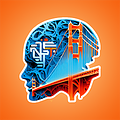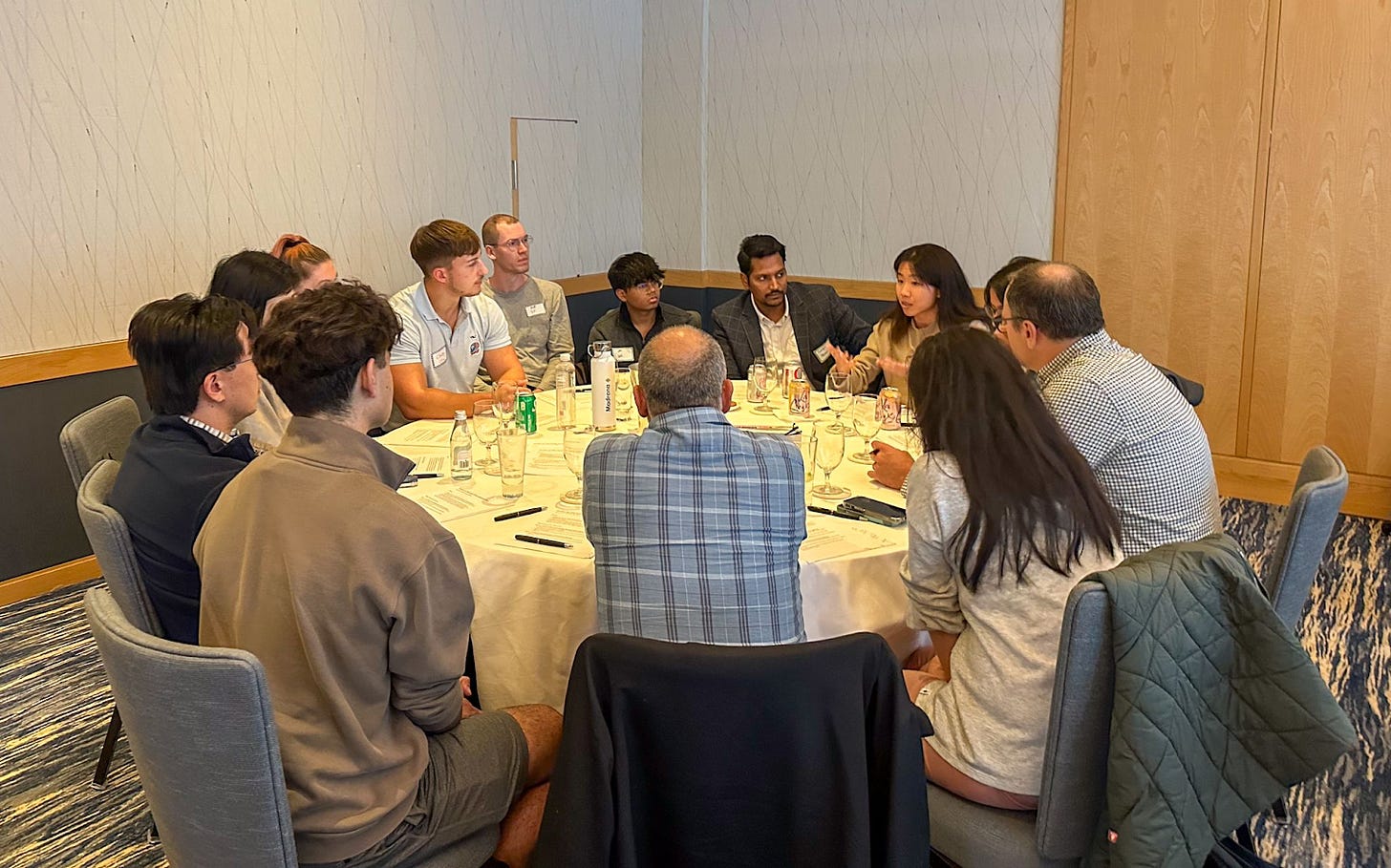Upcoming Events
🌁 SF & Bay Area
Mon, Oct 21st: Unlock Your Mind: A Journey Through Books and Community 📚
Thu, Oct 24th: AI & Creativity Workshop + Panel
🗓️ Hungry for even more AI events? Check out SF IRL, MLOps SF, or Cerebral Valley’s spreadsheet!
🗽 NYC
Wed, Oct 16th: AWS Bedrock Day w/ GenAI Collective, Anthropic, Mistral, & Meta
Tue, Oct 29th: NYC Research Roundtable
Mon, Nov 4th: a16z x GenAI Collective Dinner
Wed, Nov 13th: NYC Demo Night 🚀
🌆 Los Angeles
Tue, Oct 15th: 🧠 GenAI Collective LA 🧠 Consumer AI #LATechWeek
🏛️ Washington DC
Thu, Oct 17th: 🧠 GenAI Collective 🧠 DC Kickoff 🏛️
If you didn’t get a chance to listen to our most recent episode of the Collective Intelligence Community Podcast, go listen to our very own Thomas Joshi’s interview with Quinn Slack, CEO of the AI code intelligence platform Sourcegraph. They dive into his learnings from co-founding Blend Labs and discuss how code search is shaping the future of developer productivity!
2024: The Year AI Agents Matured Beyond Single Foundation Models
Back in April, we published a post on the promise of AI agents, highlighting some of the recent developments in the GenAI ecosystem. This idea of multiple, distinct AI systems collaborating to solve complex problems has long been the promise of AI companies, and the enterprise ecosystem longs for autonomous agents to fundamentally change how knowledge workers interact with software and eat into rising labor costs. To that end, we continue to witness new foundation models and inference architectures surpassing human benchmarks at more complex tasks, but the lack of maturity in the agentic development ecosystem has hamstrung their potential. Development teams require better tooling to abstract out the complexity of building, deploying, and evaluating these systems, which has led to paralysis when moving from test to production.
Today, the picks and shovels of building agentic systems are maturing rapidly and democratizing innovation for building and deploying end-to-end agents. Although agentic frameworks like AutoGen, Crew AI, and LangGraph have been around for the first wave of foundation model-based application development, their feature advancements coupled with higher developer awareness are redefining the future of building AI applications. This week, OpenAI’s release of their agent framework "Swarm" adds a new dimension, allowing AI agents to form coordinated networks that adapt, learn, and work together. Let’s explore how the maturity of the agent tooling layer is quickly pushing us past the co-pilot phase into the agent economy.
Why Now? What’s Changed?
Key technological shifts are making this the right time for agentic AI frameworks. Single-agent systems, while powerful, struggle with complex, real-world applications that require dynamic adaptability and coordination. Smaller foundation models (SLMs) have shown powerful reasoning capabilities and cost effectiveness but still function in isolation, lacking the interaction needed for multi-step workflows or cross-domain problem-solving.
Recent developments in AI frameworks like AutoGen, Crew AI, and OpenAI’s swarm capabilities have enabled multiple AI agents to work in tandem. This approach leverages specialized agents with unique roles—analysts, executors, quality controllers—all collaborating to achieve a higher level of productivity and effectiveness. For example, Crew AI can orchestrate a team of AI agents that break down complex workflows into smaller tasks and coordinate effectively to achieve the desired result, functioning much like a highly specialized workforce. The unlock comes from these platforms abstracting out agentic workflows and functionality through simple API calls, software libraries, and front end platform features.
McKinsey reports that in 2024, 65% of organizations are now using generative AI in at least one business function, nearly double the percentage from last year. While marketing and software development are the most common use cases, agentic AI systems are extending these applications to more operationally demanding scenarios like risk assessments and loan underwriting, driving higher value across various business areas. A 2024 report from CapGemini across ~1000 enterprises found that 62% of organizations are already using AI agents or plan to deploy them in the next 12 months.
The Era of Collaborative Intelligence
2024 marks a pivotal year for the generative AI ecosystem. Unlike traditional LLM-based systems, which operate as static information processors, AI agents are action-oriented and collaborative. They can plan, coordinate, and execute tasks across different domains, mimicking real-world workflows with greater efficacy. This shift towards agentic intelligence is comparable to moving from desktop software to SaaS—it's about adaptability, continuous improvement, and the ability to tackle increasingly complex, multi-stage tasks. Here’s how some leading frameworks are driving this change:
AutoGen allows for collaborative generation of code, documents, or creative outputs by coordinating multiple agents.
Crew AI functions as a team coordinator, directing specialized agents to tackle complex projects together.
LangGraph facilitates the visualization of agent interactions, allowing developers to construct more transparent and effective collaborative models.
OpenAI’s swarm capabilities allow agents “in a swarm” to operate like a cohesive unit—distributing tasks, pooling data, and adapting in real-time to solve challenges. This allows them to handle the type of large-scale problems that individual AI models simply cannot. This week they also released an MLE-bench for measuring the capabilities of AI agents.
How Agents are Accelerating the Future of AI Applications
The rise of agentic frameworks will transform how generative AI is applied across industries:
Scalability and Complexity Handling: AI agents are inherently scalable. Agentic frameworks like those enabled by Langchain and OpenAI can dynamically add or remove agents as needed, providing real-time adaptability and optimization. For instance, in financial services, Mckinsey estimates that agent systems are projected to reduce loan underwriting cycle times by 20-60% by breaking down tasks among multiple specialized agents
Cross-System Integration: AI agents are capable of interacting with existing software tools and digital platforms, extending generative AI’s impact from content creation to more complex use cases, such as system integration and complete workflow automation
Democratization of AI Development: By breaking down capabilities into specialized agents, the barrier to entry is reduced. Developers can utilize pre-built agents for specific functions, rather than building monolithic models that require significant investment and expertise.
The Maturity Gap: The Current State of AI Agents
The maturity levels of AI agents and LLM-based applications vary significantly depending on their use cases and integration complexity. According to Forrester’s 2024 analysis, AI agents are emerging as a top technology for operational transformation, especially in functions that require analytical decision-making combined with action capabilities. Unlike traditional LLM-based applications, which are mostly deployed for static content generation and customer engagement tasks, AI agents are being used in more operationally demanding roles. They have begun to act autonomously across different business functions, integrating into existing digital ecosystems to execute complete actions rather than just augment human capabilities.
The potential of agent-based platforms has kept VCs drooling. According to PitchBook, $8.2 billion in funding has poured into 156 AI agent startups over the last 12 months, an increase of 81% year over year. In late September, early-stage VC firm Felicis released a market map showing some of the early leaders in the AI agent economy with the public market incumbents they’re trying to disrupt:
Current Challenges and What Lies Ahead
Despite the optimism, there are challenges. Coordination between AI agents can be computationally expensive, and ensuring that agents collaborate effectively is non-trivial. Additionally, ethical concerns arise from the autonomy of these agents. The risk of cascading errors—where one agent’s mistake could lead to incorrect actions by others—remains a significant challenge. Companies using agentic AI systems must build in robust accountability measures and human oversight mechanisms to mitigate risks. These include setting boundaries for agent autonomy, real-time monitoring, and ensuring outputs are verified before execution
However, as these technologies mature, the potential for them to transform entire sectors—healthcare, finance, marketing, and beyond—continues to grow. AI agents are likely to become integrated into workflows that require cross-functional collaboration, reducing manual intervention and improving productivity in ways not previously achievable with standalone foundation models.
How do you envision agentic frameworks and agent-based apps shaping the future of AI? If you would like to share your thoughts, hit up Eric on the community Slack, or reach out via email at eric@gaicollective.com for a feature in our next newsletter!
Events Spotlight
☔ Seattle
Welcome to our PNW powerhouse! At the beginning of October, Seattle launched its inaugural event in partnership with the renowned Madrona Ventures. During an intimate Discussion Forum style event, more than 65 of Seattle’s top AI thought leaders, engineers, founders, and investors came together to share their ideas on 4 key topics:
AI & The Physical World
Scaling AI for Enterprise
From Research Lab to Market
The Role of Big Data
We are extremely excited to continue growing our influence in Seattle, a place with an incredible level of AI talent. Our chapter is posed with the prime opportunity to bridge collaboration between some of the biggest ships driving the AI industry and an incredibly high quality pool of new startups. Looking forward we have several events planned to foster exactly these conversations. Be sure to follow our Seattle Luma Calendar to make it to our next events!
Join the GenAI Collective team! 👷
The GenAI Collective is growing and we need passionate, visionary community builders to join our team! If you want to join a team of 30+ organizers helping to shape the future of AI, we have tons of exciting ways to get involved. Read more about each opportunity below and learn how you can contribute to this vibrant community!
About Eric Fett
Eric leads the development of the newsletter and online presence. He is currently an investor at NGP Capital where he focuses on Series A/B investments across enterprise AI, cybersecurity, and industrial technology. He’s passionate about working with early-stage visionaries on their quest to create a better future. When not working, you can find him on a soccer field or at a sushi bar! 🍣






Very excited.